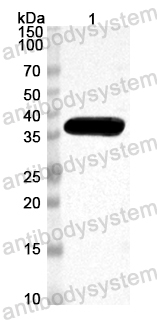Catalog No.
PMG58101
Species reactivity
Mouse
Host species
Rabbit
Isotype
IgG
Clonality
Polyclonal
Immunogen
E. coli - derived recombinant Mouse RIPK1 (Met1-Pro310).
Tested applications
ELISA: 1:4000-1:8000, IHC: 1:50-1:100, WB: 1:1000-1:4000
Target
Receptor-interacting serine/threonine-protein kinase 1, 2.7.11.1, Cell death protein RIP, Receptor-interacting protein 1, RIP-1, Ripk1, Rinp, Rip
Purification
Purified by antigen affinity column.
Accession
Q60855
Applications
ELISA, IHC, WB
Form
Liquid
Storage buffer
0.01M PBS, pH 7.4, 50% Glycerol, 0.05% Proclin 300.
Stability and Storage
Use a manual defrost freezer and avoid repeated freeze thaw cycles. Store at 2 to 8°C for frequent use. Store at -20 to -80°C for twelve months from the date of receipt.
Ficolin-3 Activates Complement and Triggers Necroptosis in Cholangiocarcinoma Cells via the RIPK1/RIPK3/MLKL Signaling Pathway., PMID:40407231
MLKL-Mediated Necroptosis Predominantly Contributes to Immune-Associated Myocardial Damage., PMID:40195182
A determination of the main regulators of necroptosis in testicular tissue under different heat stresses., PMID:39856359
Expression of RIPK-1 and S-100B in traumatic brain injury- exploring a forensic cases series., PMID:39676104
TBK1-associated adapters TANK and AZI2 protect mice against TNF-induced cell death and severe autoinflammatory diseases., PMID:39562788
The Effect of Pexidartinib on Neuropathic Pain via Influences on Microglia and Neuroinflammation in Mice., PMID:39475839
Association of RIPK1 and RIPK2 Gene Polymorphisms with Rheumatoid Arthritis in a Chinese Han Population., PMID:39444708
Inhibition of receptor interacting protein kinase-1 (RIPK1) in the treatment of murine lupus., PMID:38906550
Molecular signatures in prion disease: altered death receptor pathways in a mouse model., PMID:38802941
Pharmacological inhibition of ICOS attenuates the protective effect of exercise on cardiac fibrosis induced by isoproterenol., PMID:38224847
The anti-cancer drug candidate CBL0137 induced necroptosis via forming left-handed Z-DNA and its binding protein ZBP1 in liver cells., PMID:37995810
Spatiotemporal expression patterns of ZBP1 in the brain of mouse experimental stroke model., PMID:37952561
A newly synthesized thiosemicarbazide derivative trigger apoptosis rather than necroptosis on HEPG2 cell line., PMID:37776268
SARS-CoV-2 immune complex triggers human monocyte necroptosis., PMID:36870284
TRAIL-Based Therapies Efficacy in Pediatric Bone Tumors Models Is Modulated by TRAIL Non-Apoptotic Pathway Activation via RIPK1 Recruitment., PMID:36428719
The HSP90 inhibitor 17-DMAG alleviates primary biliary cholangitis via cholangiocyte necroptosis prevention., PMID:36037317
Diverse actions of sirtuin-1 on ovulatory genes and cell death pathways in human granulosa cells., PMID:35840944
Necroptosis Inhibition by Hydrogen Sulfide Alleviated Hypoxia-Induced Cardiac Fibroblasts Proliferation via Sirtuin 3., PMID:34769322
The injury response to DNA damage in live tumor cells promotes antitumor immunity., PMID:34665642
TNF-α-dependent neuronal necroptosis regulated in Alzheimer's disease by coordination of RIPK1-p62 complex with autophagic UVRAG., PMID:34646380
Airway epithelial cell necroptosis contributes to asthma exacerbation in a mouse model of house dust mite-induced allergic inflammation., PMID:34045680
Extracellular vesicles of Fusobacterium nucleatum compromise intestinal barrier through targeting RIPK1-mediated cell death pathway., PMID:33769187
A toolbox for imaging RIPK1, RIPK3, and MLKL in mouse and human cells., PMID:33589776
The Role of RIPK1/3 in Adult Onset Still's Disease Patients With Liver Damage: A Preliminary Study., PMID:33329521
Intravitreal administration of adalimumab delays retinal degeneration in rd10 mice., PMID:32816354
Protein-Bound Polysaccharides from Coriolus Versicolor Induce RIPK1/RIPK3/MLKL-Mediated Necroptosis in ER-Positive Breast Cancer and Amelanotic Melanoma Cells., PMID:32531147
Caspase-8-Dependent Inflammatory Responses Are Controlled by Its Adaptor, FADD, and Necroptosis., PMID:32428502
Clinical phenotype of a Chinese patient with RIPK1 deficiency due to novel mutation., PMID:32181283
Targeted enhancement of the therapeutic window of L19-TNF by transient and selective inhibition of RIPK1-signaling cascade., PMID:31803362
RIP1 inhibition blocks inflammatory diseases but not tumor growth or metastases., PMID:31101885
FKBP12 mediates necroptosis by initiating RIPK1-RIPK3-MLKL signal transduction in response to TNF receptor 1 ligation., PMID:31028177
Complement C5b-9 and Cancer: Mechanisms of Cell Damage, Cancer Counteractions, and Approaches for Intervention., PMID:31024572
Atg14 protects the intestinal epithelium from TNF-triggered villus atrophy., PMID:30894050
OTULIN limits cell death and inflammation by deubiquitinating LUBAC., PMID:29950720
Rhinovirus 3C protease suppresses apoptosis and triggers caspase-independent cell death., PMID:29449668
Identification of an antibody-based immunoassay for measuring direct target binding of RIPK1 inhibitors in cells and tissues., PMID:29226625
Dendritic Cell RIPK1 Maintains Immune Homeostasis by Preventing Inflammation and Autoimmunity., PMID:29212904
Necroptosis controls NET generation and mediates complement activation, endothelial damage, and autoimmune vasculitis., PMID:29078325
Differential regulation of cell death pathways by the microenvironment correlates with chemoresistance and survival in leukaemia., PMID:28582465
Dehydroleucodine Induces a TP73-dependent Transcriptional Regulation of Multiple Cell Death Target Genes in Human Glioblastoma Cells., PMID:27671304
An outline of necrosome triggers., PMID:27052312
Ripoptosome Analysis by Caspase-8 Coimmunoprecipitation., PMID:26933246
Characterization of RIPK3-mediated phosphorylation of the activation loop of MLKL during necroptosis., PMID:26024392
Identification of RIP1 as a critical mediator of Smac mimetic-mediated sensitization of glioblastoma cells for Drozitumab-induced apoptosis., PMID:25880091
RIPK1 promotes death receptor-independent caspase-8-mediated apoptosis under unresolved ER stress conditions., PMID:25476903
Retinal ganglion cell (RGC) programmed necrosis contributes to ischemia-reperfusion-induced retinal damage., PMID:24751757
Expression of genes related to anti-inflammatory pathways are modified among farmers' children., PMID:24603716
Anti-CD70 immunocytokines for exploitation of interferon-γ-induced RIP1-dependent necrosis in renal cell carcinoma., PMID:23613854
RIP1 protein-dependent assembly of a cytosolic cell death complex is required for inhibitor of apoptosis (IAP) inhibitor-mediated sensitization to lexatumumab-induced apoptosis., PMID:22927431
The fate of renal allografts hinges on responses of the microvascular endothelium., PMID:22710034

